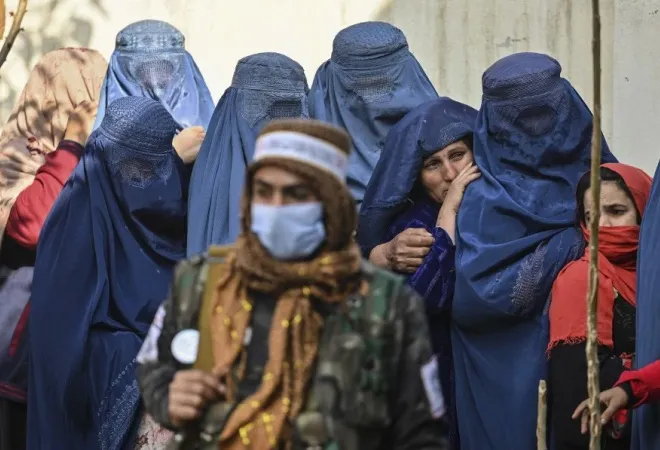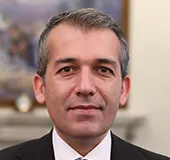-
CENTRES
Progammes & Centres
Location
As Afghanistan marks the anniversary of the takeover by the Taliban, the international community should reaffirm their commitment to addressing the humanitarian crisis that is unfolding in Afghanistan.

The peace talks in Doha—a part of the United States’ (US) strategy to disengage and withdraw from Afghanistan—reversed the gains of the past 20 years achieved by the sacrifice of a resilient nation. It marks a second fall for Afghanistan and reminds us of the fact that despite its crucial role in the Cold War in helping the West defeat the Soviets, it was left to the mercy of the Taliban in 1996—a group that was newly created by the Pakistan ISI in 1994 to control Afghanistan.
The Afghans have always desired lasting and durable peace and would make the utmost effort to achieve it. Afghanistan has been a constant battleground for great power rivalries. In the 19th century, it served as a buffer zone for the British empire to prevent the Russians from making any advances toward India, and in recent times, it was a battlefield of armed insurgency against the Soviets’ invasion of Afghanistan which not only lead to the loss of 2 million Afghan lives but also devastated the country.
An improved healthcare system and a proper Afghan national defence and security forces rooted in democratic values were also set up.
Afghanistan’s role in defeating the Soviets brought freedom to millions of people across Europe and Central Asia but caused endless pain, suffering, and misery to its own people that remains till today.
In 2001, the western engagement opened a new chapter in the relations between Afghanistan and the world. The Afghans believed that their cries were heard and the West came to help them build their country from scratch. Post-2001, the global engagement in Afghanistan was unprecedently remarkable and caused a political and social transformation within the Afghan society. This transformation saw the introduction of universal values by the international community to the ultra-conservative Afghan society, generous development aids, the introduction of democracy, freedom of speech, the inclusion of women in all aspects of society, and a change in the perspectives of Afghans. It witnessed the first democratic transition of political power. Despite the claims of electoral fraud, three major presidential and parliamentary elections took place for the first time in the history of Afghanistan.
The state and nation-building process was in full swing, with the support of the international community, and the idea of Afghanistan being run by elected leaders was fully accepted. An improved healthcare system and a proper Afghan national defence and security forces rooted in democratic values were also set up. While the civil society grew and the pool of human capital expanded, they also witnessed the emergence of a vibrant young generation eager to make positive change and participate in political and social life.
The Afghan war in the early years positively served the internal politics of many western countries and secured victory in the political campaigns by promoting the defeat of the Taliban and the nation-building endeavour as part of the dominant narrative.
By 2021, women made up to 27 percent of the Parliament (lower house), 22 percent of the (upper house), 22 percent of government employees (with 9 percent of them at decision-making levels), 22 percent of civil servants, 5 percent of the security sector, 10 percent of the legal and judicial sectors. Four of the key cabinet positions were occupied by women, and two women served as ambassadors in the US and UN. 12 million students (grades 1 to 12) were in schools, and 40 percent of them were female students.
Despite the Taliban’s war that the Afghans had to adjust to and overcome, many in the West were against the prevailing status quo. The increase in Taliban’s violence, daily bombings of populated cities, a high number of civilian casualties, and the internal political fuss made the international community run out of patience and initiate the Doha peace process to end the Taliban’s brutal war.
The Afghan war in the early years positively served the internal politics of many western countries and secured victory in the political campaigns by promoting the defeat of the Taliban and the nation-building endeavour as part of the dominant narrative. Since it no longer served the purpose, it was discarded and scaled down to the Doha hotel halls.
The most noteworthy component of the Doha peace process was that the agreement was signed by Mr Khalilzad, the US Special Envoy, and the Taliban in 2020, with the Afghans completely absent from the negotiation table. Agreeing to engage directly with the Taliban by excluding the legitimate Afghan government gave the Taliban an upper hand and unprecedented political freedom to engage with other players such as Russia and China, amongst others. The Taliban leaders were until then leading violent-armed campaigns against the Afghans and were now engaging with many international dignitaries in their luxury residences in Doha.
The Taliban used the talks to exhaust the US and propagate a victory over the international forces in Afghanistan, with the support of Russia, Pakistan, Iran, and China. The Taliban used the agreement to force the Afghan government to release 5,000 Taliban prisoners who were captured by the Afghan national defence and security forces over the years as a pre-condition to any face-to-face talks with the Afghan government.
Agreeing to engage directly with the Taliban by excluding the legitimate Afghan government gave the Taliban an upper hand and unprecedented political freedom to engage with other players such as Russia and China, amongst others.
Defeatism, desperation, abandonment, a decline of support for the Afghan government and the repeated withdrawal announcements coloured the perceptions of many experts and officials in the West even before the Taliban agreement.
15 August 2022 marks the anniversary of the Taliban takeover of Afghanistan. They reversed every single gain of the past 20 years. They gave shelter to the leader of Al-Qaeda, oppressed people, banned girls from schools and barred women from the public, and imposed thousands of other oppressive regulations that the world is already privy to.
The Afghan people deserve a better life and a free and prosperous society, and it is incumbent on the international community to help them achieve it. It is time for the international community to disengage with the Taliban, reimpose the travel ban, and hold them accountable for the crimes they commit against the people of Afghanistan.
The latest decision by the US to not release US$7 billion in foreign assets of the Afghan funds to the Taliban is a welcomed step towards holding the Taliban accountable for their deeds and continued onslaughts against the civilians in Afghanistan. The international community must address the humanitarian crisis in Afghanistan and continue to help the Afghans without engaging directly with the Taliban. The international community must think about facilitating political alternatives for Afghanistan. The past 20 years produced a great deal of human capital that can better lead Afghanistan towards self-reliance. The post-2001 generation of Afghanistan which was part of the state bureaucracy and worked shoulder to shoulder with the international community is a reliable political alternative for Afghanistan’s democratic future.
The views expressed above belong to the author(s). ORF research and analyses now available on Telegram! Click here to access our curated content — blogs, longforms and interviews.

Sediq Sediqqi was the Former Deputy Minister for Strategy and Policy Ministry of Interior Affairs and the Spokesperson to the President of the Islamic Republic ...
Read More +